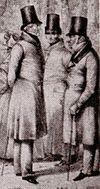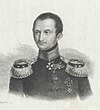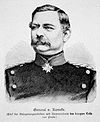Ministry of War (Prussia)
This article needs additional citations for verification. (January 2019) |
 |
|---|
The Prussian War Ministry was gradually established between 1808 and 1809 as part of a series of reforms initiated by the Military Reorganization Commission created after the disastrous Treaties of Tilsit. The War Ministry was to help bring the Army under constitutional review, and, along with the General Staff systematize the conduct of warfare. Gerhard von Scharnhorst, the most prominent and influential of the reformers, served as acting war minister from roughly 1808 until 1810 (he was also Chief of the General Staff).
History
The War Ministry was established on 25 December 1808, replacing the old military institutions.[1] The Ministry consisted of two departments. The first department was responsible for the command and condition of the army, the second for its financial administration.
At first, no War Minister was appointed due to the resistance of Frederick William III. Gerhard von Scharnhorst became head of the first department (the General War Department; Allgemeines Kriegsdepartement) and Lieutenant Colonel Graf Lottum became head of the second department. Scharnhorst also functioned as acting War Minister, as long as no permanent appointment was made.
The first department in turn consisted of three divisions. The first division represented the continuation of the old Adjutancy-General and was also known as the "secret military cabinet". It in turn had control over the general war chancellery. The second division of the War Ministry dealt with general army matters: troop formations, replacements and turnover, housing, military exercises, and mobilization. A third division was also created: the artillery and engineering division. This in turn comprised the artillery section, which dealt with artillery equipment, rifle production, ordnance production, gunpowder factories, etc.; and the engineering section, which was responsible for maintaining the fortresses.
The second department, the military economy department, had four divisions. The first division was responsible for pay, the second for catering, the third clothing and the fourth invalids.
In 1919, it formed the basis of Weimar Germany's Ministry of the Reichswehr.
Location

For exactly one hundred years, from 1 January 1819 to 1 January 1919 (when the ministry ceased to exist) in the Friedrichstadt quarter of what is today Mitte:
- Leipziger Straße 5 facing south, with the garden bordering on the Prinz-Albrecht-Palais (demolished in 1935 to erect the Ministry of Aviation building)
Additional office usage
- 1824 Wilhelmstrasse 81
- 1871 Old General Staff building, Behrenstraße 66
General Staff
- after approximately 1820: Behrenstraße 66 (now the rear part of offices belonging to the Russian embassy)
- 1867/71 new building (Great General Staff) in the Tiergarten: Königsplatz (now the Platz der Republik), the western corner facing the Moltkestraße
Military cabinet
- after approximately 1820: Hinter dem Gießhaus 2 (behind the Zeughaus)
- around 1900: Behrenstraße 66
Prussian Ministers of War, 1808–1919
† denotes people who died in office.
| No. | Portrait | Minister | Took office | Left office | Time in office |
|---|---|---|---|---|---|
| 1 | Gerhard von Scharnhorst (1755–1813) | 1 March 1808 | 17 June 1810 | 2 years, 108 days | |
| 2 | Karl von Hake (1768–1835) | 17 June 1810 | August 1813 | 3 years, 1 month | |
| 3 | Hermann von Boyen (1771–1848) | 3 June 1813 | 26 December 1819 | 6 years, 206 days | |
| 4 | Karl von Hake (1768–1835) | 26 December 1819 | 20 October 1833 | 13 years, 298 days | |
| 5 | Job von Witzleben (1783–1837) | 25 April 1835 | April 1837 | 1 year, 341 days | |
| 6 | Gustav von Rauch (1774–1841) | 30 July 1837 | 28 February 1841 | 3 years, 213 days | |
| 7 | Hermann von Boyen (1771–1848) | 1 March 1841 | 6 October 1847 | 6 years, 219 days | |
| 8 | Ferdinand von Rohr (1782–1851) | 6 October 1847 | 2 April 1848 | 179 days | |
| 9 | Karl von Reyher (1786–1857) | 2 April 1848 | 26 April 1848 | 24 days | |
| 10 | August Wilhelm Graf von Kanitz (1783–1852) | 26 April 1848 | 16 June 1848 | 51 days | |
| 11 | Ludwig Freiherr Roth von Schreckenstein (1789–1858) | 16 June 1848 | 7 September 1848 | 83 days | |
| 12 | Ernst von Pfuel (1779–1866) | 7 September 1848 | 2 November 1848 | 56 days | |
| 13 | Karl von Strotha (1786–1870) | 2 November 1848 | 27 February 1850 | 1 year, 117 days | |
| 14 | August von Stockhausen (1791–1861) | 27 February 1850 | 31 December 1851 | 1 year, 307 days | |
| 15 | Eduard von Bonin (1793–1865) | 31 December 1851 | 1854 | 3 years | |
| 16 | Friedrich Graf von Waldersee (1795–1864) | 1854 | 6 November 1858 | 4 years | |
| 17 | Eduard von Bonin (1793–1865) | 6 November 1858 | 28 November 1859 | 1 year, 22 days | |
| 18 | Albrecht von Roon (1803–1879) | 5 December 1859 | 9 November 1873 | 13 years, 339 days | |
| 19 | Georg von Kameke (1817–1893) | 9 November 1873 | 3 March 1883 | 9 years, 114 days | |
| 20 | Paul Bronsart von Schellendorff (1832–1891) | 3 March 1883 | 8 April 1889 | 6 years, 36 days | |
| 21 | Julius von Verdy du Vernois (1832–1910) | 8 April 1889 | 4 October 1890 | 1 year, 179 days | |
| 22 | Hans von Kaltenborn-Stachau (1836–1898) | 4 October 1890 | 19 October 1893 | 3 years, 15 days | |
| 23 | Walther Bronsart von Schellendorff (1833–1914) [a] | 19 October 1893 | 14 August 1896 | 2 years, 300 days | |
| 24 | Heinrich von Gossler (1841–1927) | 14 August 1896 | 15 August 1903 | 7 years, 1 day | |
| 25 | Karl von Einem (1853–1934) | 15 August 1903 | 11 August 1909 | 5 years, 361 days | |
| 26 | Josias von Heeringen (1850–1926) | 11 August 1909 | 7 June 1913 | 3 years, 300 days | |
| 27 | Erich von Falkenhayn (1861–1922) | 7 June 1913 | 21 January 1915 | 1 year, 228 days | |
| 28 | Adolf Wild von Hohenborn (1860–1925) | 21 January 1915 | 29 October 1916 | 1 year, 282 days | |
| 29 | Hermann von Stein (1854–1927) | 29 October 1916 | 9 October 1918 | 1 year, 345 days | |
| 30 | Heinrich Scheuch (1864–1946) | 9 October 1918 | 2 January 1919 | 85 days | |
| 31 | Walther Reinhardt (1872–1930) | 2 January 1919 | 13 September 1919 | 254 days |
For further succession, see List of German defence ministers.
Notes
- ^ Younger brother of Paul Bronsart von Schellendorff.
References
- ^ Levinger, Matthew Bernard, 1960- (2000). Enlightened nationalism : the transformation of Prussian political culture, 1806–1848. Oxford: Oxford University Press. ISBN 0195131851. OCLC 41445771.
{{cite book}}: CS1 maint: multiple names: authors list (link) CS1 maint: numeric names: authors list (link)























